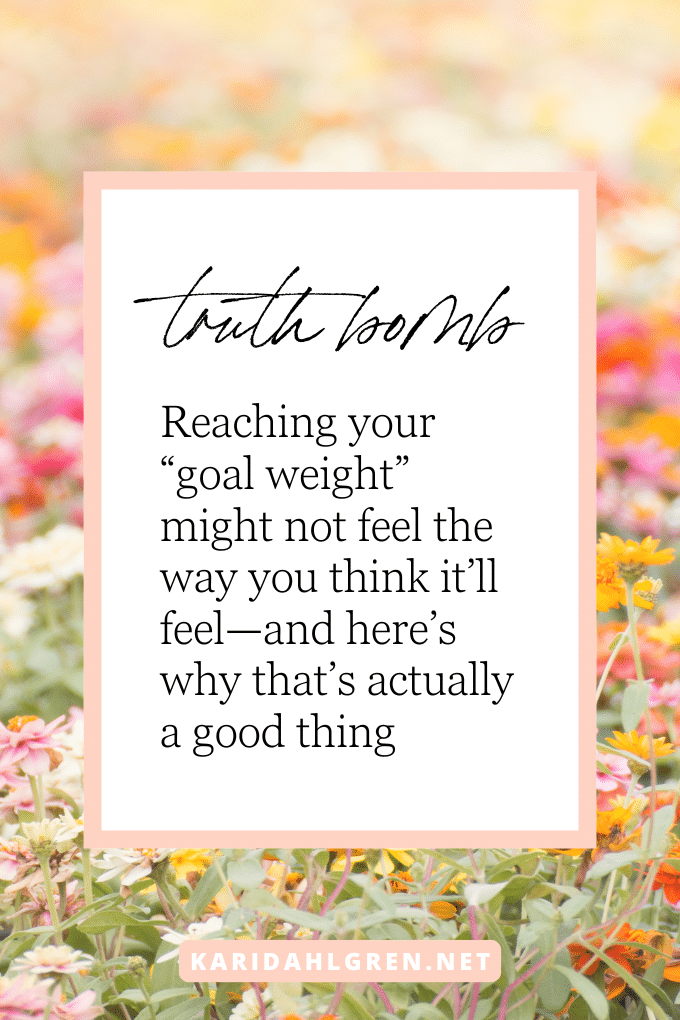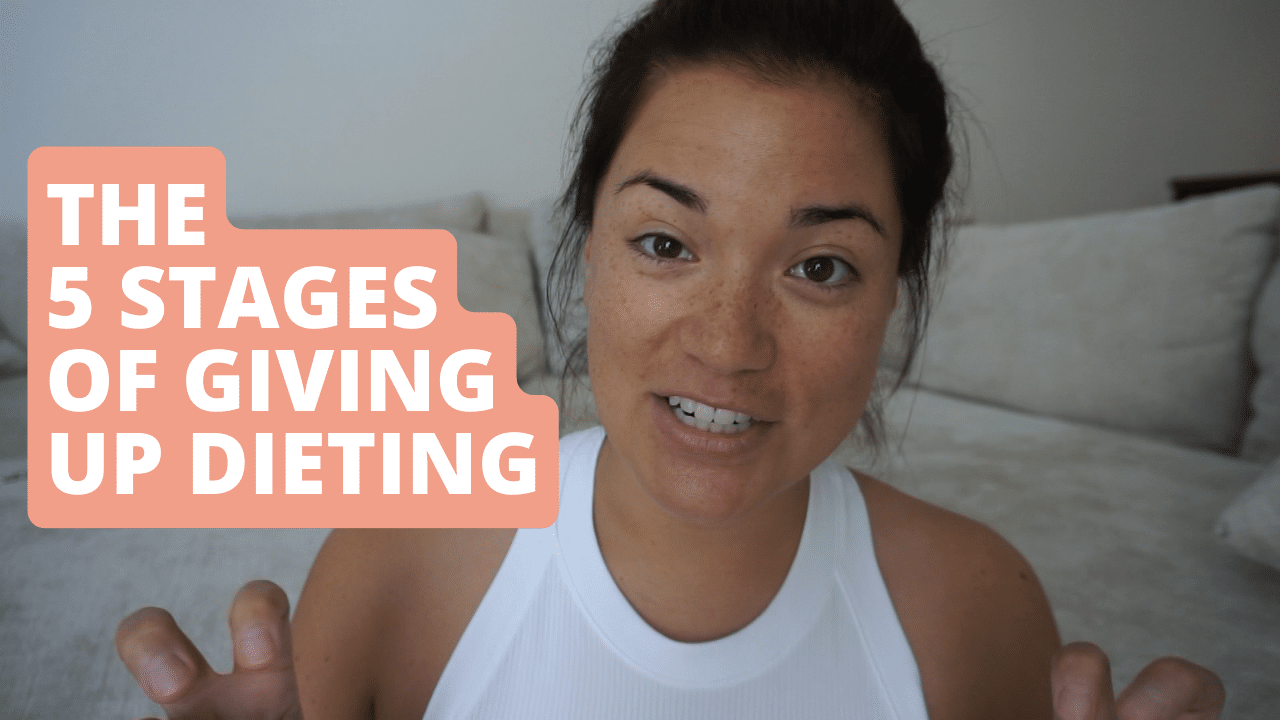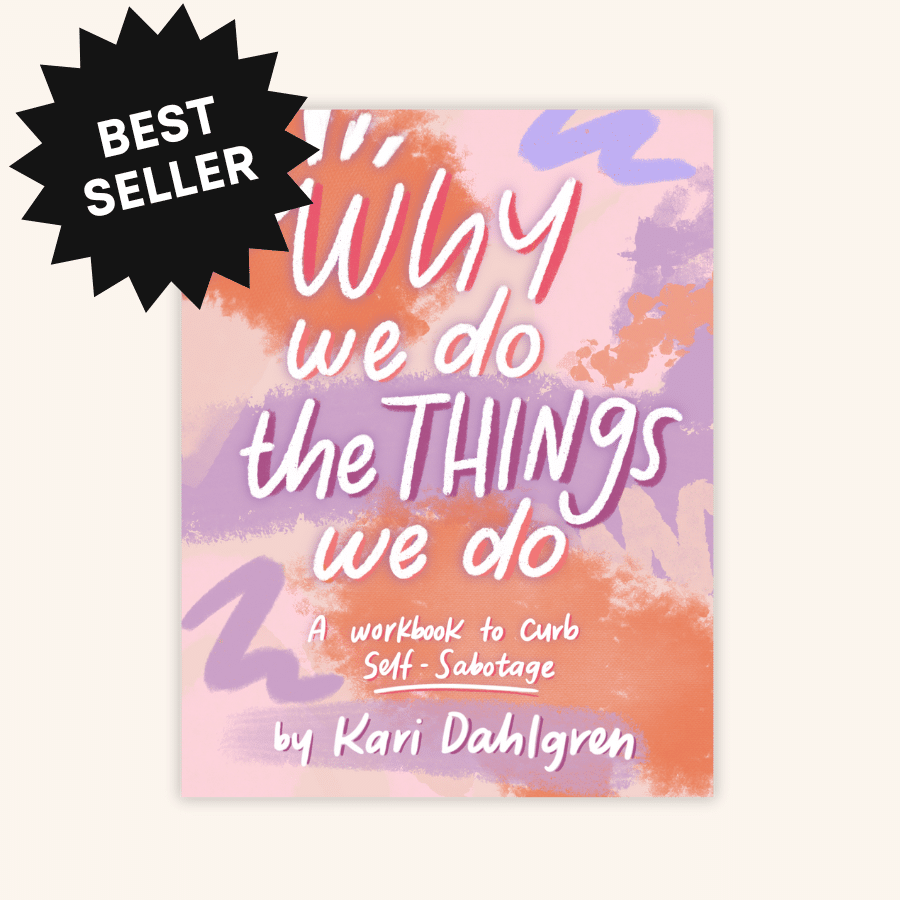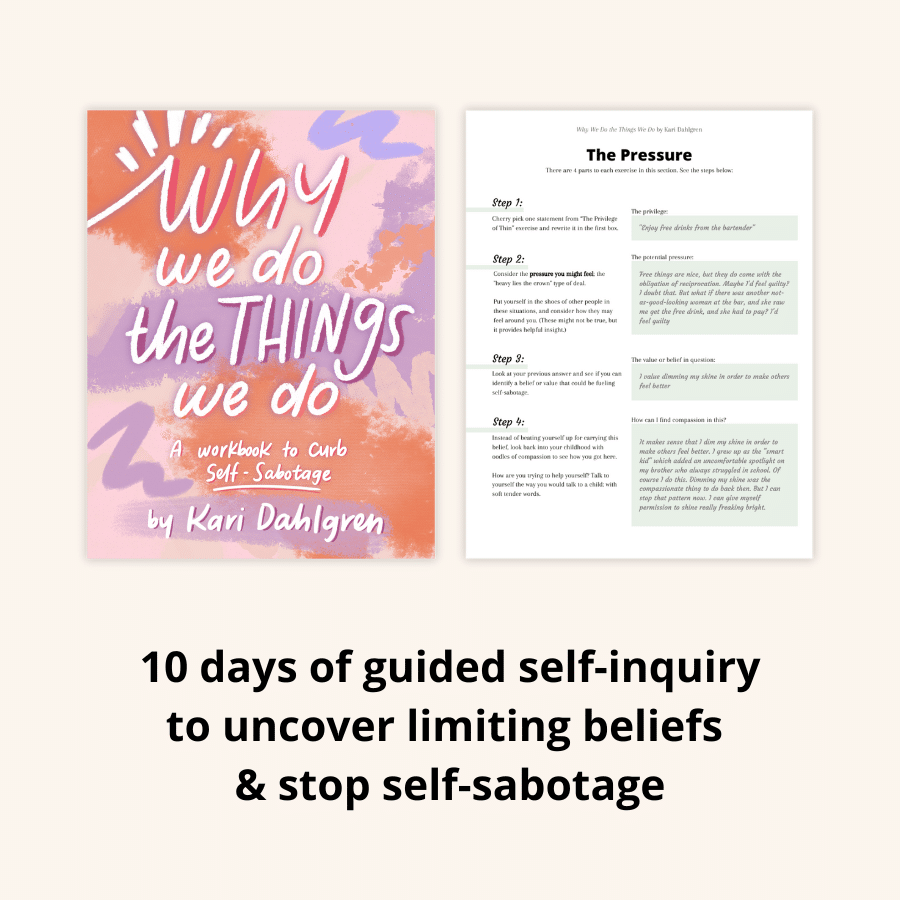
The road to reaching your natural weight can be tough, and today I want to talk about that tough part. Because if I can be honest with you… It’s probably not going to feel the way you think it’ll feel.
On one hand, settling upon a lower set point weight can be a lot of fun. There will be many joys—many that might feel exactly the way you think they’ll feel, like the joy of fitting into form-fitting clothes, or the joy of wearing clothes that aren’t all black.
But settling upon a new natural weight and staying there isn’t the fun joy ride that many of us think it will be. You can get there, though, if you are willing to feel the full spectrum of emotion and adjust your expectations.
Side note: I originally wrote this “truth bomb” in 2018, two years after I gave up dieting. Since then, I’ve learned that this is a frequent pattern experienced by many people who also decide to give up dieting, and I hope this article helps prepare you just in case it happens to you too.
When Life Gets Challenging, It’s a Call for Authenticity
There are two ways to lose weight, both of which are challenging: dieting and feeling your authentic discomfort (aka, Stop-Drop-and-Feeling). Dieting leads to short-term weight loss but for many people, it actually causes weight gain and even weight overshoot (gaining more than you lost) in the long run, according to clinical studies.[1], [2], [3]
The only upside—and to call it an upside is truly a stretch—is that feeling preoccupied with food and thinking about food all the time just so happens to keep icky feelings at away. Temporarily, of course. However, the feelings we keep away with overeating only come back stronger, so really, this isn’t an upside at all. It’s a rollercoaster stuck on one track that never seems to end.
Feeling your authentic discomfort, however, may lead to weight loss if you’re above your natural weight or at a higher “set point weight,” but it takes much more time, patience, and grit than dieting. The only downside is that you have to be willing to feel the emotions that you dislike the most. For me, this includes loneliness and rejection—woof. For you, it could be anxiety, stress, disappointment, dread, or some other blend of ick.
The upsides are plentiful though.
When you choose to feel your authentic discomfort instead of reaching for food as a buffer, the benefits may include but are not limited to: reaching your natural weight, gaining confidence in yourself, discovering who you truly are at your core, gaining clarity on your life purpose, increasing authenticity in every corner of your world… The list can go on and on.
Feeling your authentic discomfort is clearly the winner, so why is it so hard? Why is it so much easier to slip back into dieting instead of sticking to the well-trodden path of giving up dieting and feeling your authentic discomfort instead?
I believe the answer is toxic positivity. We live in a culture that worships thinness and happiness, and the two have become inextricably connected. We think that we’re doing something wrong when we feel unhappy, and we’ve been trained to believe that thinness will secure our worth.
Except it doesn’t.
Authenticity: A Call for a 50/50 Life—And Why That’s Really Great
![the 50/59 of life: maybe life isn’t meant to be 90% happy. maybe life is meant to be 50/50—in a really good way [yin yang symbol]](https://karidahlgren.net/wp-content/uploads/2018/09/yin-yang-1.png)
In my opinion, an authentic life is 50/50 good and bad, where 50% involves challenging emotions and the other 50% is really quite amazing. Toxic positivity, however, has taught us that life should be 90% happy and if it’s less than that, you’re doing it wrong.
This belief can lead to overeating because, when life doesn’t feel happy, we turn to food to buffer our pain. What we resist persists. When we feel unhappy and then resist the unhappiness, we feel worse. This kickstarts the vicious cycle of toxic positivity leading to increased unhappiness and, as a result, overeating to buffer the discomfort.
A culture of toxic positivity never prepared us for an authentic life.
Toxic positivity told us, “Go to school, get the good job so that you can afford the good things and life a good life.” Oh, and don’t forget: “Do all this while making everyone else around you happy, or you’re doing that wrong too!” This created an enormous expectation for continuous happiness and positivity, and when life inevitably falls short, we feel bad. And then we eat.
Challenging emotions shouldn’t be numbed—they should be felt with courage and an open heart. That’s authentic living, and that’s how you heal your relationship with food.
When You Want to Lose Weight, It’s a Call for Courage
The simplest road map to success is the Psycho-Spiritual Wellness eating guidelines, and it takes courage to follow. It asks you to stop dieting, listen to your body, and feel your authentic discomfort when you want to eat past fullness—especially the uncomfortable feelings that make you want to crawl out of your skin.
That last part is the doozy. Of course, the ‘listening to your body’ part is hard for those with a history of overeating, but the feeling part? Can we just skip that, please?
This is why so many people say:
“I don’t have any problems, really. My life is great. It’s just the weight thing that I need to figure out.”
That’s definitely how it seems on the surface, but there are hidden roots beneath the surface. It can all be (a bit harshly) summed up by Geneen Roth’s infamous saying: the way we eat tells all.
Here’s an edgy analogy that I hope drives the point home: Compulsive eating is like the giant, beautiful skin tag on my dear Obaachan’s (grandmother’s) face that sucked up all her loose skin and prevented any wrinkles, even at the age of 92. It’s not that she “didn’t have any wrinkle problems”—it’s that the skin tag was picking up all the slack, and so the wrinkles never had a chance to manifest.
The same goes for compulsive eating. When we run around and do all the things and please all the people and work all the hours, we’re cutting a corner somewhere, and that cut corner shows up in our patterns around food.
How I Discovered the Pool of Emotion I Once Ignored
When I started “feeling my feelings” thing back in 2016, I thought that it was just a coincidence that I started going through a rough patch. Things went going wrong left and right, and I felt it deeper than normal. I thought that the rough patch would end at some point, like usual, then it hit me…
After a few months of these heavy feels, I realized that it was just the normal discomfort of everyday life! But because I used to buffer with food so often, I wasn’t even aware that life was normally uncomfortable 50% of the time…
In hindsight, I was transitioning through the 3rd stage of giving up dieting:

When you give up dieting, you go through several stages, the third of which is “when life seems to get worse in non-food-related areas.” When we open ourselves up to our authentic discomfort, it doesn’t just mean life feels challenging when we want to overeat. It means that life feels more challenging in general—but it’s authentic, and as we discussed earlier, this is the better problem to have!
Dieting keeps you focused on the surface level of food and therefore never really leads to useful skills other than the willpower to restrict your diet, which just keeps you stuck in the restrict-binge cycle. Feeling your authentic discomfort, however, provides you with the evergreen skill of emotional tolerance: the ability to withstand discomfort without getting swept into compulsion.
It’s Normal to Feel Challenging Emotions Sometimes
I used to think that discomfort meant that I was doing something wrong, which is why I would numb with food whenever I wasn’t happy. Since embarking on this journey seven years ago, I have become much better at tolerating challenging emotions, and at first, I was honestly surprised by how much of it existed in my life.
That’s why I’m writing this article: to prepare you for the potential discomfort ahead… the discomfort that’s also coupled with the awesomeness of reaching your natural weight! But still, the truth bomb remains: This road is going to challenge you. The enormous upside? This time you’re also building a skill that will help you everywhere else in your life, unlike dieting.
What This Might Look Like
When you choose to feel your feelings instead of numbing with food, many uncomfortable things might happen, such as:
- When you have a bad day, you can’t come home and eat junk food. You have to actually come home, sit down, and process what’s going on…
- When you feel rejected by a friend or significant other, you can’t reach for a pint of ice cream. You have to actually feel that heavy feeling of rejection… without ice cream.
- When you feel anxious and you don’t know why, you have to actually sit with that feeling instead of distracting yourself with food…
When you stop numbing with food and choose to feel your authentic discomfort instead, you’re vulnerable… but it’s normal!
Here’s an example from my life about one year after giving up dieting:
The heaviest emotion to me is rejection. You can give me anxiety and depression and shame—and I won’t like it—but rejection? Nuh-uh. When rejection comes around, I run for the hills. And usually those “hills” are actually my kitchen cabinet.
When I started “feeling my feelings” instead overeating—through the Stop, Drop, & Feel—I had to start practicing staying with the feeling of rejection instead of spinning out and reaching for food. It took me a while (over a year) to develop that skill. It was challenging.
But allowing myself to pay attention to the feeling of rejection is much better than overeating to numb the pain, and ending up feeling both rejected and bloated… In this way, life at your natural weight might feel even more challenging than before… and it’s also full of magic. It’s a trade-off, and this one is worth it to me.
Last Thoughts
Maybe your gremlin isn’t rejection. Maybe it’s vulnerability, shame, self-loathing, anxiety, or depression. Whatever that big, scary feeling is, see if you can open yourself up to it. It just might be the toughest thing you ever did, but you’ll get better at it.
As you develop the skill of being good at being uncomfortable, it gets easier to gradually reach your natural weight and feel normal around food again.




Kari,
This is deep, insightful, and absolutely truthful! No one wants to look at these truths – I think these truths never enter our conciousness unless someone insightful presents them. It’s just easier to distract with food or another diet or fad. Thank you so much for sharing your wisdom.
Love,
Liz
Thank you so much for the comment Liz! I’m happy that you read it all the way through even though I mostly talked about how much life is going to suck 🙂 in the best way possible!
Hi Kari.
I live in South Africa. Your entire approach is amazing and ground breaking. Well done girl.
I am giving this a go at the age of 59 and i started while on holiday in the Netherlands!!
I find that after only about 4 days the SDF method comes naturaly and as you said i use it in more areas of my life.
I will invest in the work book to start off with.
Thank you for being available to me. I might need you yet .
Erika Breytenbach
RSA
Hi Erika! How amazing that I am able to reach you on the other side of the globe! And I am so so proud of you for actually doing the SDF. It is not an easy practice, and I hope that you know I am cheering you on. 🙂
This is an amazing read for someone who is just starting out on this journey. It’s reality, and it’s great to read it upfront. I’ll be referring back to this read when times get tough. Thank you so much for sharing!
Music to my ears Sofia!! It makes me sooo happy that it’ll be a resource in the times when you need it.
Kari, I love how you word everything in NORMAL SPEAK, with very descriptive words and phrases. I know I am an EMOTIONAL EATER, my depression dictates how and what I want to eat, you can betcha it ain’t a salad…. nobody ever looked at a head of lettuce and though, All my problems can be cured by this head of crunchy water.
Gurrrrl, ain’t that the truth! Salads are only good when they sound good 🙂 thank YOU for dropping me a line!